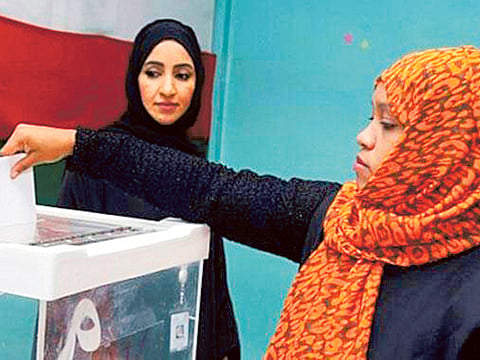For Omani women in public office, slow and steady wins the race
Democracy and women’s political engagement go hand in hand, says noted Omani writer

Muscat: For the first time in Oman Municipal Council, an entire province is being represented by only women.
When Oman held its Muncipal Council elections in December, Mariam Al Shamsi and Latifa Al Manei won the only seats for the Sunnainah province of the Buraimi governorate.
With only seven women securing seats in the 202-member body, the number seems low but it is much higher than 2012 elections when only four women made it to the council.
Oman seems to be pushing forward and realising the importance of women in a political office — albeit slowly.
“It is just a matter of time,” Al Shamsi, 36, told Gulf News. “Men will gradually accept us in public office.”
Before running for municipal council office, Al Shamsi and Al Manei were active members of their community, regularly volunteering their time at charities. They also helped run the Family Development Centre in their area which provides family counselling to local women, arranges lectures and courses for designing handicrafts and jewellery.
“Many local women have benefited from these courses as they opened their own jewellery and Omani traditional handicrafts shops,” Al Shamsi said.
Al Shamsi’s volunteer work made her a well-known figure in her small town, particularly among women.
She said getting to know people through volunteerism made her aware of the community’s issues and motivated her to get into politics.
“Women in my province want to see it more developed. They want more roads and parks,” she told Gulf News.
When she decided to run in the Muncipal Council elections, some men in her community refused to talk to her, as conservative social attitudes generally frown upon women in public office.
“I did not let it affect me,” she told Gulf News.
“I knew sooner or later they would have to accept me, and that is exactly what happened. Now they come talk to me directly if they have any requests for municipal services.”
“But, of course, more is needed to change the mindset of men towards women in the country,” Al Shamsi told Gulf News.
Currently, there is only one woman in Oman’s Shura Council, the elected lower house of the state council, which has some legislative powers.
In 1994, Oman became the first Gulf State to allow women to vote and in 2011 Sultan Qaboos Bin Saeed opened the municipal council up for elections.
Noted Omani writer Zakariyah Al Mahrami believes that democracy and women’s political involvement go hand in hand.
“The more the country opens up to democracy the more women we will see in parliamentary and legislative posts,” he told Gulf News.
“In general more and more Omani women are educated and many even hold PhD degrees. This is good for the country and for democracy as women are more empowered and engaged,” he said.
“My father encouraged me to run in the municipal elections,” Sana Al Mashari, a mother of four, told Gulf News. “He was also a Municipal Council member in the 90s.”
“I had to do a lot of campaigning in my province of Amerat, which meant I was highly visible and seen,” she told Gulf News.
“My father and husband supported me throughout the whole process.”
She hopes to use her position to fight for the betterment of low-income families.
“I want to organise exhibitions where families can sell their products to help them make the ends meet,” she said.
“I want to give a voice to the voiceless,” she said.
In 2009, Oman celebrated Women’s Day for the first time where Sultan Qaboos said how education and employment opportunities have advanced the role and status of women in the country.
“We have facilitated this through regulations and laws that guarantee their rights,” he said, during a speech on the occasion.
Rahma Al Beloushi, a teacher in Muscat, thinks that women are making progress in the country.
“Omani women have proved they are capable of being a part of the political life of the country. We just need more support and acceptance from men.”
Sign up for the Daily Briefing
Get the latest news and updates straight to your inbox



